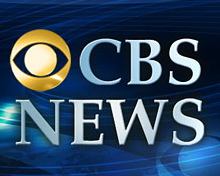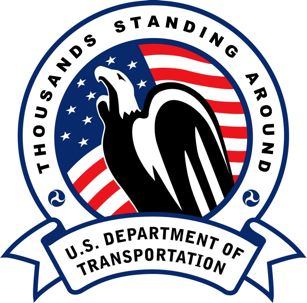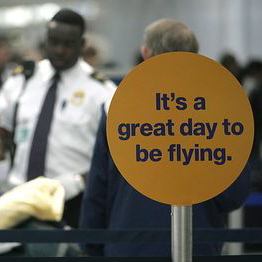 As Travel Editor for CBS News (as well as his other positions) Peter is often called upon to report on breaking travel news.
As Travel Editor for CBS News (as well as his other positions) Peter is often called upon to report on breaking travel news.
In the wake of latest attack on the American aviation system, an attempt on Christmas, no less, by a man with alleged links to Al-Qaeda, Peter appeared on a number of reports on CBS and elsewhere.
Read on for clips, transcripts, quotes and all the latest reporting on the real state of airline security.
First, there’s Peter’s recent column for CBSNews.com discussing the new airport security rules recently imposed by the TSA.
Second, Peter offered another take on the confusing new TSA rules for a CBS News report.
Next, check out this video report below on how you can deal with delays and the new security rules–and get some advice from Peter from The Early Show:
You can watch the complete CBS Evening News from 12/28/09 here.
And if you missed The O’Reilly Factor, check out what Peter told guest host Eric Bolling about airline security below.
ERIC BOLLING (EB): With us now is Peter Greenberg, the travel editor for CBS News. Peter, thanks for joining us here. OK, so give us the latest on the new rules.
PETER GREENBERG (PG): They’re confusing.
EB: Inconvenient.
PG: They are. And it’s just a reaction to what happened Christmas day without any real effectiveness. Let’s start about the rules that started, right? Only one carry-on bag for flights coming into the United States per passengers.
You can’t have — you can’t get up for the last hour of the flight. You can’t go to the bathroom for the last hour of the flight. You can’t have a blanket or pillow the last hour of flight. You can’t even hold a book or a laptop computer in your hand for that last hour of the flight. And that’s getting a little crazy.
EB: Is this going to work?
PG: Of course it’s not going to work. Here’s what’s happening… they’re not dealing with the core issue of how did this guy get on the plane in the first place? The real issue here is, is the plane secure or not? And that happens on the ground, not in the air.
EB: Peter, it’s less than — less than about a day since they announced rules. They may be already scaling back.
PG: They are. They’re now saying in some cases you may be able to keep your blanket. Have you seen the condition of those blankets? That’s a lethal weapon. That’s a biohazard. Why would you even want the blanket? You can keep the blanket, maybe the pillow. They’re even beginning to realize how silly this is.
 EB: So where did the system break down? I mean, a lot of people say we should have more security in Amsterdam, we should have more security in Nigeria. Is that true?
EB: So where did the system break down? I mean, a lot of people say we should have more security in Amsterdam, we should have more security in Nigeria. Is that true?
PG: It’s not about more security; it’s the technology that you apply. This guy cleared security three times. He cleared it in Lagos. And then when you transfer after you’re cleared twice, through a passport control check. They check you again. And then at the gate.
Here’s the question: What equipment were they using? Were they using equipment that could recognize chemical explosions? The answer is no, they weren’t.
If I took Richard Reid’s shoes today, eight years later, and took them on a conveyor belt in LaGuardia, guess what I’d find? They don’t show anything, because those machines could only recognize metal.
EB: What about those swabs where they can swab to see if there’s any explosives on some of the baggage? Would that work?
PG: It would work, but they’re only doing that on a random basis right now. Same thing with those puffer machines. If you don’t have a unilateral application of security — I’m not talking about profiling — just a unilateral application of security, you don’t have security.
EB: Well, let me ask you. How much would it cost to install puffer machines and the swab mechanism on all international airports — security lines?
PG: A whole lot less than dealing with the aftermath of a bad incident.
EB: Are we talking, you know, tens of billions?
PG: Not at all. If you’re talking about all airports that are international gateway airports, you’re probably talking $2 billion. To put that in perspective over a long period of time, the amortization costs, it’s worth it.
 EB: All right. Give us some — some clues. We’re going to be traveling. What should we not do and what should we do?
EB: All right. Give us some — some clues. We’re going to be traveling. What should we not do and what should we do?
PG: No. 1, you know, I’m not a big fan of checked bags to begin with. I haven’t checked a bag in eight years. There are only two kinds of airline bags: carry on and lost anyway. So what do I do? I FedEx my bags, UPS them. I save two and a half hours of my life every time I travel by not checking bags.
Second of all, we have to change in the culture of how we travel. We were all trained to dress to go to the airport. Not being too literal here, I’m telling people to undress before they go to the airport. The Ziploc bags, everything you own goes into that Ziploc bag: your spare keys, your change, your watches, your jewelry. Dress after you pass through the detector, because I don’t want to be standing behind you while you’re emptying your pocket with everything that’s been in there since 1947.
EB: You know, Peter, I can just — I can see this. I have visions. I’m standing in line and, you know, people are annoyed, and the TSA are more annoyed. And there are going to be fights breaking out. Should we expect a 50 percent increase in the time it takes to get through security or more?
PG: The answer is in the next week maybe, but after that no, because there’s a slow period of time. Not that many people traveling between January and President’s weekend or between January and Easter. So I think this will settle down. What we really have to figure out is security without common sense is just downright stupidity.
EB: Peter, do they win? Does al Qaeda win by — by all this additional effort we have to go through now for an average American to get on a flight from Kansas City to Chicago?
PG: Well, if there’s such a thing in investing in TSA futures, I guess they’d win. But the bottom line is, all they did was get our attention in a way that’s not going to help anybody, because we’re doing a knee-jerk reaction to an issue that has to be dealt with on the ground.
And the TSA is doing a very bad job of camouflaging what the real issue is. Either the plane is secured or it’s not, and that happens at the airport; it doesn’t happen on the plane.
EB: Peter, thank you very much. Thank you very much. Great insight, my friend.
PG: You’ve got it.
For more on aviation security, don’t miss our Travel Safety & Security section.
- New Security Measures: What To Expect on Your Next Flight
- The Travel Detective Blog: New TSA Rules
- Thwarted Terror Attack Boosts Safety & Security Measures
- Additional TSA Security Measures: Progressive or Oppressive?
- TSA Boosts Screening for Powders; Liquid Ban Lingers
- Greenberg-Tested, TSA-Approved Toiletries
- Will “Improved” TSA Watch List Make Us Safer?












